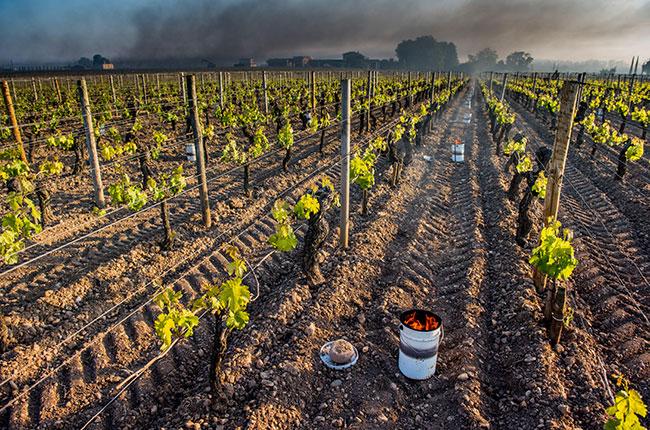Climate Change Threatens Bordeaux: A Closer Look at the Future of Wine Production
As the world grapples with the escalating effects of climate change, one of the most cherished regions for wine production is facing an uncertain future. The Financial Times has recently delved into the ramifications of shifting weather patterns on Bordeaux, a region synonymous with fine wines and rich viticultural heritage. Rising temperatures, altered rainfall, and an increase in extreme weather events pose significant challenges not only to the traditional winemaking practices but also to the very identity of Bordeaux itself. This article explores the urgent implications of climate change on this iconic wine-producing region, shedding light on the resilience of its vintners and the innovative strategies they are adopting to safeguard their craft for generations to come.
Impact of Rising Temperatures on Bordeaux’s Wine Production
The Bordeaux region, celebrated for its prestigious wines, faces profound challenges due to rising temperatures linked to climate change. Vintners are already observing shifts in grape development cycles, with earlier bud breaks and accelerated ripening phases. These changes threaten to disrupt the delicate balance between acidity and sugar levels in grapes, ultimately affecting the quality of the final product. The increase in temperature can also exacerbate the risk of pests and diseases, further complicating vineyard management.
As producers adapt to these climatic shifts, many are turning to innovative strategies to safeguard their harvests. Common initiatives include:
- Shifting Vineyards: Some winemakers are relocating vineyards to cooler altitudes or northern regions.
- Embracing New Varieties: The introduction of heat-resistant grape varieties is becoming more prevalent.
- Water Management: Enhanced irrigation techniques are being implemented to protect vines during heatwaves.
These adaptive measures not only aim to preserve the integrity of Bordeaux wines but also underscore the resilience of the wine community in the face of evolving climatic realities.
Adaptation Strategies for Vineyards Facing Climate Challenges
As climate change poses increasing risks to vineyards, particularly in regions like Bordeaux, wine producers are adopting innovative adaptation strategies to safeguard their crops and maintain quality. Shortening the growing season through techniques like early pruning allows growers to better align with shifting climatic patterns. In addition, many vineyards are exploring altered grape varieties that are more resilient to changing temperatures and conditions. By integrating traditional practices with modern scientific research, vineyards aim to ensure sustainable production capable of withstanding the unpredictable weather patterns attributed to climate change.
Furthermore, a growing number of vineyards are investing in advanced irrigation systems to conserve water and enhance soil moisture levels, essential amidst rising temperatures. Cover cropping is also gaining traction, as it helps improve soil health and reduce erosion, contributing to a sustainable ecosystem. Below is a concise overview of some leading adaptation strategies being adopted by Bordeaux vineyards:
| Adaptation Strategy | Description |
|---|---|
| Early Pruning | Reduces growing season length to cope with climate shifts. |
| Resilient Grape Varieties | Focus on grapes that thrive in warmer conditions. |
| Advanced Irrigation | Improves water efficiency and maintains soil moisture. |
| Cover Cropping | Enhances soil health and mitigates erosion. |
Economic Consequences for Bordeaux’s Wine Industry
The wine industry in Bordeaux, synonymous with luxury and tradition, faces a looming crisis as climate change alters critical aspects of viticulture. Rising temperatures and shifts in precipitation patterns are not only threatening the quality of the region’s famed vintages but also impacting the economic stability of the entire sector. Producers are grappling with the need to adapt their cultivation practices and reconsider grape varietals to sustain their wine quality and market relevance. This transition comes with significant financial implications, including:
- Increased production costs: Implementing new agricultural techniques and investing in climate-resilient technologies can strain financial resources.
- Market volatility: Alterations in harvests and variations in wine profiles risk destabilizing prices and consumer demand.
- A shift in labor needs: Changes in vineyard management will require different skill sets, potentially leading to labor shortages or retraining challenges.
As Bordeaux’s producers respond to these challenges, the potential for economic diversification emerges. By integrating sustainable practices and exploring new markets, winemakers could not only mitigate adverse effects but also capitalize on the growing demand for environmentally friendly products. The economic landscape may witness shifts such as:
| Adaptation Strategies | Potential Economic Benefits |
|---|---|
| Investment in technology | Increased yield efficiency |
| Exploring new varietals | Access to new consumer bases |
| Sustainable tourism initiatives | Enhanced brand reputation and revenue |
Consumer Awareness and the Future of Sustainable Practices
As climate change increasingly impacts agriculture, consumer awareness becomes a vital component in shaping the future of sustainable practices. With regions like Bordeaux grappling with rising temperatures and unpredictable weather patterns, consumers have the power to influence production methods through informed choices. This growing understanding emphasizes the importance of sustainability in the wine industry, prompting producers to adapt and innovate. Engaging with brands that prioritize eco-friendly practices not only supports local economies but also encourages a collective shift towards greener methods. The conversation around ethical consumption is rapidly evolving, urging consumers to be proactive in their purchasing decisions.
The integration of sustainability into everyday consumer behavior can take various forms, such as:
- Researching brands: Investigating the sustainability commitments of wine producers.
- Supporting local producers: Opting for wines from regions implementing environmentally friendly practices.
- Participating in community initiatives: Engaging in local campaigns that promote sustainable agriculture and carbon footprint reduction.
Moreover, understanding the implications of climate change on famous wine regions could reshape consumer preferences dramatically. A recent analysis highlights the disparity between traditional viniculture and emerging, sustainable methods:
| Traditional Practices | Sustainable Practices |
|---|---|
| Heavy pesticide and herbicide use | Organic farming methods |
| High water consumption | Water conservation techniques |
| High carbon emissions | Reduced transportation and local sourcing |
By fostering greater consumer awareness, the wine industry can evolve into a more sustainable model, ensuring not just the preservation of regions like Bordeaux, but also the integrity of the product enjoyed worldwide.
The Way Forward
As the effects of climate change increasingly encroach upon traditional wine regions, the future of Bordeaux stands at a pivotal crossroads. The findings discussed in this Financial Times report highlight the urgent need for adaptation and innovation within the industry. With changing temperatures and unpredictable weather patterns posing significant challenges, winemakers must navigate an evolving landscape where the very essence of their craft is at stake. Stakeholders, from vineyard owners to policymakers, must collaborate to develop sustainable practices that not only preserve the heritage of Bordeaux but also ensure its viability for future generations. The clock is ticking, and proactive measures are essential if this iconic wine region is to withstand the mounting pressures of a warming planet.




